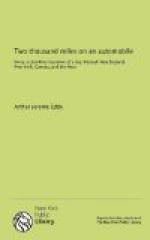It was in 1770, while in prison in England, that Ann Lee claimed to have had a great revelation concerning original sin, wherein it was revealed that a celibate life is a condition precedent to spiritual regeneration. Her revelation may have been biased by the fact that she herself was married, but not comfortably.
In 1773, on her release from prison, another revelation told her to go to America. Her husband did not sympathize with the celibacy proposition, left “Mother Ann,” as she was then known, and went off with another woman who was unhampered by revelations. This was the beginning of desertions which have continued ever since, until the men are reduced to a corporal’s guard.
The principles of the Shakers, barring celibacy, are sound and practical, and, so far as known, they live up to them quite faithfully. Like the original Oneida community, they believe in free criticism of one another in open meetings. They admit no one to the society unless he or she promises to make a full confession before others of every evil that can be recalled,—women confess to women, men to men; these requirements make it difficult to recruit their ranks. They are opposed to war and violence, do not vote, and do not permit corporal punishment. They pay their full share of public taxes and assessments and give largely in charity. Their buildings are well built and well kept, their farms and lands worked to the best advantage; in short, they are industrious and thrifty.
Communism is one of those dreams that come so often to the best of mankind and, lingering on through the waking hours, influence conduct. The sharp distinctions and inequalities of life seem so harsh and unjust; the wide intervals which separate those who have from those who have not seem so unfair, that in all ages and in all countries men have tried to devise schemes for social equality,—equality of power, opportunity, and achievement. Communism of some sort is one solution urged,—communism in property, communism in effort, communism in results, everything in common.
In 1840 Emerson wrote to Carlyle, “We are all a little wild here with numberless projects of social reform. Not a reading man but has a draft of a new community in his waistcoat pocket. I am gently mad myself, and am resolved to live cleanly. George Ripley is talking up a colony of agriculturists and scholars, with whom he threatens to take the field and book. One man renounces the use of animal food; another of coin; and another of domestic hired service; and another of the State; and on the whole we have a commendable share of reason and of hope.”
Ripley did found his Brook Farm, and a lot of good people went and lived there—not Emerson; he was just a trifle too sane to be won over completely, but even he used to go into his own garden and dig in a socialistic way until his little boy warned him not to dig his foot.




